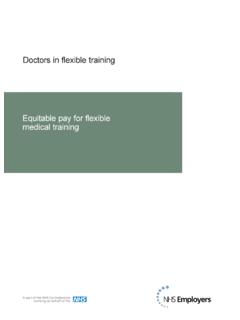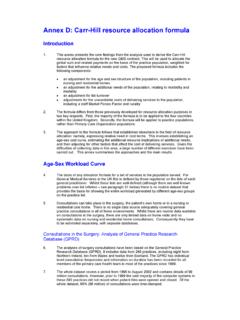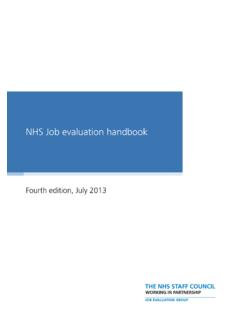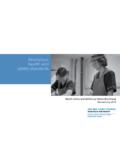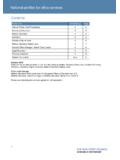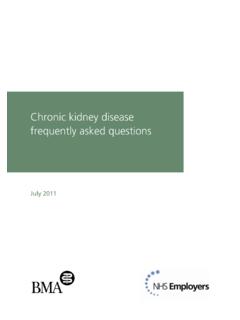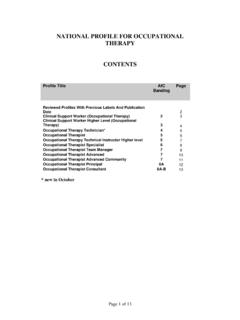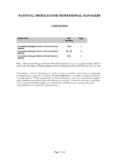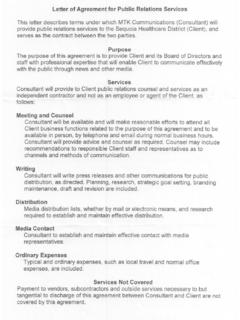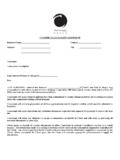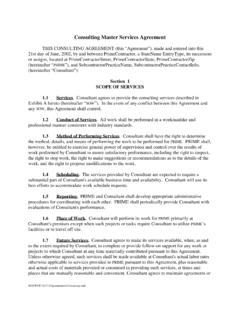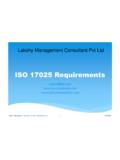Transcription of Terms and Conditions - nhsemployers.org
1 1 Terms and Conditions Consultants (England) 2003 DEFINITIONS .. 2 Schedule 1 Commencement of employment .. 5 Schedule 2 Associated duties and responsibilities .. 6 Schedule 3 Job planning .. 7 Schedule 4 Mediation and appeals .. 10 Schedule 5 Recognition for emergency work arising from on-call duties .. 12 Schedule 6 Extra programmed activities and spare professional capacity .. 14 Schedule 7 Premium time .. 16 Schedule 8 On-call rotas .. 17 Schedule 9 Provisions governing the relationship between NHS work, private practice and fee paying services .. 18 Schedule 10 Fee paying services .. 21 Schedule 11 Principles governing receipt of additional 24 Schedule 12 Other Conditions of employment .. 25 Schedule 13 Basic salary and payment for additional programmed activities for consultants appointed before 31 October 2003 .. 27 Schedule 14 Basic salary and payment for additional programmed activities for consultants appointed after 31 October 2003.
2 33 Schedule 15 Pay thresholds .. 37 Schedule 16 Pay supplements .. 39 Schedule 17 Pension arrangements .. 42 Schedule 18 Leave and public holidays .. 43 Schedule 19 Termination of employment .. 48 Schedule 20 Incorporated general council Conditions of service .. 49 Schedule 21 Model provisions for expenses NHS consultants .. 51 Schedule 22 Locum consultants .. 64 Schedule 23 Application of Terms and Conditions of service for NHS consultant clinical academics .. 66 Schedule 24 Maternity Leave and Pay (Temporary Schedule) .. 69 Schedule 25 Employment Break Scheme (Temporary Schedule) .. 80 Schedule 26 Redundancy Pay (Temporary Schedule).. 83 Schedule 27 Caring for Children and Adults (Temporary Schedule).. 89 Schedule 28 Flexible Working Arrangements (Temporary Schedule) .. 91 Schedule 29 Balancing Work and Personal Life (Temporary Schedule).. 93 The Terms and Conditions set out in this document shall incorporate, and be read, subject to any amendments which are from time to time the subject of negotiation by the appropriate negotiation bodies and are approved by the Secretary of State after considering the results of such negotiations.
3 Any amendments should be published. Version 1 - 20 October 2003 Version 2 - 19 January 2004 Version 3 1 June 2005 Version 4 1 March 2007 Version 5 2 April 2007 2 Version 6 30 July 2007 Version 7 1 April 2008 Version 8 1 September 2009 Version 9 - 31 March 2013 DEFINITIONS Contractual and Consequential Services: the work that a consultant carries out by virtue of the duties and responsibilities set out in his or her Job Plan and any work reasonably incidental or consequential to those duties. These services may include: Direct Clinical Care Supporting Professional Activities Additional NHS Responsibilities External Duties. Direct Clinical Care: work directly relating to the prevention, diagnosis or treatment of illness that forms part of the services provided by the employing organisation under section 3(1) or section 5(1)(b) of the National Health Service Act 1977. This includes emergency duties (including emergency work carried out during or arising from on-call), operating sessions including pre-operative and post-operative care, ward rounds, outpatient activities, clinical diagnostic work, other patient treatment, public health duties, multi-disciplinary meetings about direct patient care and administration directly related to the above (including but not limited to referrals and notes).
4 Supporting Professional Activities: activities that underpin Direct Clinical Care. This may include participation in training, medical education, continuing professional development, formal teaching, audit, job planning, appraisal, research, clinical management and local clinical governance activities. Additional NHS Responsibilities: special responsibilities not undertaken by the generality of consultants in the employing organisation which are agreed between a consultant and the employing organisation and which cannot be absorbed within the time that would normally be set aside for Supporting Professional Activities. These include being a Medical Director, Director of Public Health, Clinical Director or lead clinician, or acting as a Caldicott guardian, clinical audit lead, clinical governance lead, undergraduate dean, postgraduate dean, clinical tutor or regional education adviser. This is not an exhaustive list. External Duties: duties not included in any of the three foregoing definitions and not included within the definition of Fee Paying Services or Private Professional Services, but undertaken as part of the Job Plan by agreement between the consultant and employing organisation.
5 These might include trade union duties, undertaking inspections for the Commission for Health Improvement (or its successor body), acting as an external member of an Advisory Appointments Committee, undertaking assessments for the National Clinical Assessment Authority, reasonable quantities of work for the Royal Colleges in the interests of the wider NHS, reasonable quantities of work for a Government Department, or specified work for the General Medical Council. This list of activities is not exhaustive. 3 Emergency Work: Predictable emergency work: this is emergency work that takes place at regular and predictable times, often as a consequence of a period of on-call work ( post-take ward rounds). This should be programmed into the working week as scheduled Programmed Activity. Unpredictable emergency work arising from on-call duties: this is work done whilst on-call and associated directly with the consultant s on-call duties (except in so far as it takes place during a time for scheduled Programmed Activities), recall to hospital to operate on an emergency basis.
6 For the purposes of Schedule 3, paragraph 6, non-emergency work shall be regarded as including the regular, programmed work of consultants whose specialty by its nature involves dealing routinely with emergency cases, A&E consultants. Fee Paying Services: any paid professional services, other than those falling within the definition of Private Professional Services, which a consultant carries out for a third party or for the employing organisation and which are not part of, nor reasonably incidental to, Contractual and Consequential Services. A third party for these purposes may be an organisation, corporation or individual, provided that they are acting in a health related professional capacity, or a provider or commissioner of public services. Examples of work that fall within this category can be found in Schedule 10 of the Terms and Conditions . Private Professional Services (also referred to as private practice ): such services as include: the diagnosis or treatment of patients by private arrangement (including such diagnosis or treatment under section 65(2) of the National Health Service Act 1977), excluding fee paying services as described in Schedule 10 of the Terms and Conditions work in the general medical, dental or ophthalmic services under Part II of the National Health Service Act 1977 (except in respect of patients for whom a hospital medical officer is allowed a limited list , Members of the hospital staff).
7 Professional and Study Leave: professional leave or study leave in relation to professional work including: study, usually but not exclusively or necessarily on a course or programme research teaching examining or taking examinations visiting clinics and attending professional conferences participation in training. Programmed Activity: a scheduled period, nominally equivalent to four hours, during which a consultant undertakes Contractual and Consequential Services. Premium Time: any time that falls outside the period 07:00 to 19:00 Monday to Friday, and any time on a Saturday or Sunday, or public holiday. General Council Conditions : The National Health Service Staff Conditions of service of general application as determined by the General Council of the Whitley Councils for the Health Services (Great Britain) as may be amended from time to 4 time, or any provisions which may be agreed by a successor body to the General Council and may reasonably be considered to have replaced the current Conditions of service.
8 5 Schedule 1 Commencement of employment 1. The date from which employment under this contract began must be stated in clause of the consultant s contract of 2. The date from which continuous employment as a consultant began for the purposes of the Employment Rights Act 1996 must be set out in clause of the contract of employment and should include, if applicable, employment with predecessor organisations that had previously held the contract, former Regional Health Authorities from whom the current contract was transferred under TUPE or equivalent arrangements. Previous employment with other NHS employing organisations does not count as continuous service for the purposes of the Employment Rights Act 1996 except as provided for under the National Health Service and Community Care Act 1990 or any other Calculation of seniority 3. NHS organisations should take into account all previous service as a consultant with other NHS employing organisations and any equivalent experience in another EEA Member State.
9 The employing organisation may, at its discretion, take into account service outside the NHS, for example including: employment outside the EEA voluntary service employment in the independent sector service in HM armed On appointment to a consultant post, Associate Specialists should be paid in line with Schedule 14 paragraph Schedule 2 Associated duties and responsibilities 1. A consultant has continuing clinical and professional responsibility for patients admitted under his or her care or, (for consultants in public health medicine) for a local population. It is also the duty of a consultant to: keep patients (and/or their carers if appropriate) informed about their condition involve patients (and/or their carers if appropriate) in decision making about their treatment maintain professional standards and obligations as set out from time to time by the General Medical Council (GMC) and comply in particular with the GMC s guidance on Good Medical Practice as amended or substituted from time to time.
10 Maintain professional standards and obligations as set out from time to time by the General Dental Council (GDC) (Dental consultants only). 2. A consultant is responsible for carrying out any work related to and reasonably incidental to the duties set out in their Job Plan such as: the keeping of records and the provision of reports the proper delegation of tasks maintaining skills and knowledge. 3. Consultants shall be expected in the normal run of their duties to deputise for absent consultant or associate specialist colleagues so far as is practicable, even if on occasions this would involve interchange of staff within the same employing organisation. This does not include deputising where an associate specialist colleague is on a rota with doctors in training. When deputising is not practicable, the employing organisation (and not the consultant ) shall be responsible for the engagement of a locum tenens, but the consultant shall have the responsibility of bringing the need to the employer s notice.
